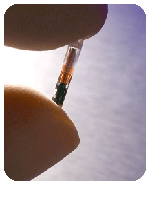 The number of total switching incidents is as high as 20,000 per year in the U.S. - Journal of Healthcare Protection Management. Image Credit: VeriChip Corporation
The number of total switching incidents is as high as 20,000 per year in the U.S. - Journal of Healthcare Protection Management. Image Credit: VeriChip CorporationRFID For Human Babies - It's Not What You Think
It would be easy to assume, when one hears about RFID for use on babies, that a chip would be implanted under the skin of the baby. In fact, the issue of human RFID tagging was explored here at Symblogogy as its very first post.
This is not the case, however, VeriChip has made special RFID bracelets and necklaces for use in the hospital environment.
Applications for use in the Military, it turns out, will not escape the "under-the-skin" approach to tagging.
Excerpts from eWeek Magazine -
VeriChip Sells First Baby Protection System, in Talks with Military
By Renee Boucher Ferguson, eWeek.com - August 25, 2006
VeriChip, the company that makes human-implantable RFID chips, is looking to span its equipment from newborns to the military's enlisted.
The company announced Aug. 24 that it has made the first sale of its infant protection, wander prevention and staff duress system to the Brampton Civic Hospital in Brampton, Ontario. Separately, the company confirmed a day earlier that it is in talks with the military to test its implantable chips in two branches of the military.
VeriChip said in a press release Aug. 24 that the Brampton hospital, under construction now, is spending $750,000 to have VeriChip's platform and applications installed at its newest facility.
VeriChip's infant protection system is really two separate above-the-skin solutions, one a band similar to a standard hospital bracelet that has an embedded RFID chip. The second option, called the Halo skin-sensing system, is similar to an electronic key fob for a car that can be attached to an infant's ankle or a patient's wrist. Another key fob-type device can be worn around the neck of staff members to use as a personal panic button.
 Using a handheld reader, healthcare professionals are able to securely access a patient's unique VeriChip ID number which can be looked up in a designated secure healthcare information database, allowing them to immediately take the safest course of action. Image Credit: VeriChip Corporation
Using a handheld reader, healthcare professionals are able to securely access a patient's unique VeriChip ID number which can be looked up in a designated secure healthcare information database, allowing them to immediately take the safest course of action. Image Credit: VeriChip CorporationBut VeriChip also has a separate patient identification system, VeriMed, which is used beneath the skin. Once the chip is implanted in the fatty part of a person's arm (or in the hand, as chip volunteers have done), it displays a 16-digit identifier when tapped by an RFID reader. The number accesses health information in a database that requires a username and password for admittance.
VeriChip, of Delray Beach, Fla., confirmed in media reports that Scott Silverman, its board chairman, has held informal meetings with U.S. Navy and Air Force officials to discuss a feasibility study of its VeriMed system.
"These were preliminary discussions in informal meetings about the VeriMed project...and how it might be incorporated into the Department of Defense's electronic health records program," said Nicole Philbin, a spokesperson for VeriChip.
The VeriMed chip, which is designed "to give voices to the voiceless in the most crucial of times," according to Philbin, would be applicable to both veterans and enlisted personnel in both the Navy and Air Force.
The idea with the VeriMed chip is that data can be accessed even if a patient is severely injured or unconscious.
While civilians have the option of choosing how much information is accessible on the VeriMed database, it's not clear what the guidelines would be for enlisted personnel.
----
The government is no stranger to RFID. In July, the Army paid $3.76 million to 3M to implement an RFID-based system that will track medical files at its massive Fort Hood Army base in Texas—the military's largest active-duty domestic base. Fort Hood houses the active medical records of more than 150,000 men and women stationed there—and their dependents' records.
In concert with NATO, the U.S. military is using RFID to track goods in war theaters as well as through global supply chains. The U.S. State Department, in concert with the Department of Homeland Security, mandated RFID-chipped passports by the end of this year. And the U.S. Food & Drug Administration recently released its recommendations for the pharmaceutical industry regarding the use of RFID to track counterfeit drugs.
The FDA also approved the use of VeriChip's VeriMed implantable chip in October 2004.
In a document titled "Guidance for Industry and FDA Staff" released in December 2004, the FDA made a couple of recommendations for VeriChip as it goes about its business of chipping individuals and groups like the military's enlisted: "When discussing the issue of medical devices that store, access, and/or transfer information externally, you should address the concept of information security," reads the document.
The FDA also identified a number of risks associated with an implantable RFID chip, including adverse tissue reaction, migration of the implanted transponder, electromagnetic interference and electrical hazards.
Read All>>

No comments:
Post a Comment